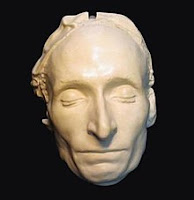Saturday, January 13, 2018
"Only a man who can say, 'I will not' is genuinely free."
R. R. Reno, "Bondage and freedom," First things no. 279 (January 2018): 63 (61-64). "We've had too much Erasmus of late, and too little Luther."
"In adoration it is never the one who adores who traverses the distance, but the one who is adored."
 Adrienne von Speyer, Theologie der Geschlechter, NB 12 (Einsiedeln: Johannes Verlag, 1969), c. 141/144, as summarized in French by Antoine Birot, "Le fondement christologique et de la différence sexuelle selon «Théologie des sexes» (NB XII) de Adrienne von Speyr," Revue catholique internationale Communio 31, nos. 5-6 (septembre décembre 2006): 127 (123-134). But "Without this positive distance there would be only fusion."
Adrienne von Speyer, Theologie der Geschlechter, NB 12 (Einsiedeln: Johannes Verlag, 1969), c. 141/144, as summarized in French by Antoine Birot, "Le fondement christologique et de la différence sexuelle selon «Théologie des sexes» (NB XII) de Adrienne von Speyr," Revue catholique internationale Communio 31, nos. 5-6 (septembre décembre 2006): 127 (123-134). But "Without this positive distance there would be only fusion."
Thursday, January 11, 2018
"A sacrament supposes that one takes time".
"Un sacrement suppose qu'on prenne le temps. . . ."
André Haquin, “La réforme liturgique de Vatican II: a-t-elle fait prevue de créativité et en quell sens?,” Recherches de science religieuse 101, no. 1 (2013): 66 (53-67).
André Haquin, “La réforme liturgique de Vatican II: a-t-elle fait prevue de créativité et en quell sens?,” Recherches de science religieuse 101, no. 1 (2013): 66 (53-67).
Wednesday, January 10, 2018
"you now send me a semblance of death [(a serious illness)] in an exercise of your mercy, before you really send me death in an exercise of your judgment."
 "vous m’envoyez maintenant une espece de mort pour exercer vostre misericorde, avant que vous m’envoiyez effectivement la mort pour exercer vostre jugement."
"vous m’envoyez maintenant une espece de mort pour exercer vostre misericorde, avant que vous m’envoiyez effectivement la mort pour exercer vostre jugement."Blaise Pascal, "Prière pour demander à Dieu le bon usage des maladies" 3, Œuvres de Blaise Pascal 9 (Paris: Librairie Hachette, 1914), ed. Léon Brunschvieg & Pierre Boutroux, p. 326 (319 ff.). Trans. Wight:
thou sendest me now a partial death in order to exercise thy mercy, before thou sendest me death effectively in order to exercise thy judgment.
Tuesday, January 9, 2018
A middling holiness redeemed via sickness and death
 |
| Source |
Georg Bernanos, as quoted by Jean-Pierre Batut. "De la nature à la gloire, la grâce de la maladie," Communio: revue international catholique 39, no. 3 (mai-juin 2014: 106 (97-107). This is, I think, an example of "the mute offering of the sinner" so characteristic of "the middling classes of sanctity" and "salvation" that is to be contrasted with "the heroic offering of the saint" (105). I now have the official English translation (Jean-Pierre Batut, "From nature to glory: the grace of illness," Communio: international Catholic review 41, no. 3 (Fall 2014): 526 (515-528)):
Bernanos again, very near to his end, expressed better than anyone else in his diary this coincidence of our profound will, beyond all its errors and all its cowardly acts, and the divine will with a view to our ultimate offering: 'We want all that he wills, but we do not know that we want it; we do not know ourselves; sin makes us live at the surface of ourselves; we return to ourselves only to die, and that is where he awaits us.'
The sick person as "minister of the celebration of the power of God that acts in weakness"
 "the sacrament of the anointing of the sick, by impressing a messianic seal upon the person who receives it, prepares him to become [a] minister of the celebration of the power of God that acts in weakness, and, so, to become, for the whole people [of God, a] sign and instrument of this essential paschal truth among [them] all."
"the sacrament of the anointing of the sick, by impressing a messianic seal upon the person who receives it, prepares him to become [a] minister of the celebration of the power of God that acts in weakness, and, so, to become, for the whole people [of God, a] sign and instrument of this essential paschal truth among [them] all."Jean-Pierre Batut, "De la nature à la gloire, la grâce de la maladie," Communio: revue international catholique 39, no. 3 (mai-juin 2014: 104 (97-107).
it is not by any of his acts of power that [Jesus] saves us, but precisely in and through his impotence. If he is our great [high] priest, this is not despite his weakness, but inasmuch as [he is] 'enveloped in weakness' (perikeitai astheneian), as the Epistle to the Hebrews puts it (5:2). It's not just that he is 'not unable to sympathize with our weaknesses' (4:15), but that weakness is the priestly garment [(vêtement)] in which he is clothed [(revêtu)] in order that he might consummate his offering. . . . [So] if [the sick person] is united with Christ, the state of sickness becomes [the] sacramental grace of participation in his salvific weakness, causing the sick person to pass over from the resources of his nature to the hope of glory in the blessed resurrection.
Thus, just as in baptism the duel of one with death becomes [the] victory of life to the benefit of all, [so] in the sacrament of the sick the combat of one against sickness and against the death that it prefigures becomes for the multitude a participation in the sacrifice of the cross. . . .
Subscribe to:
Comments (Atom)
